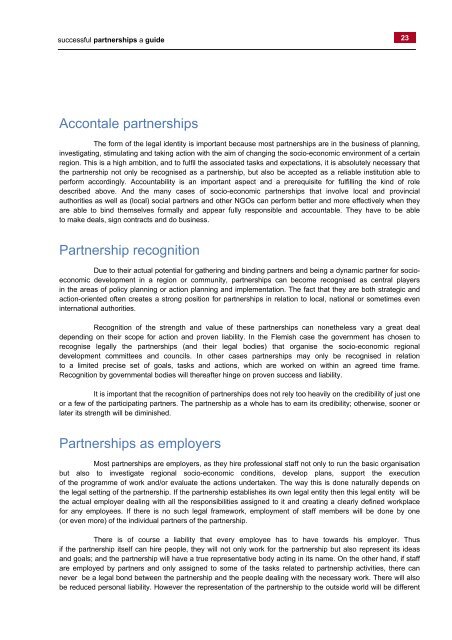successful partnerships a guide - Organisation for Economic Co ...
successful partnerships a guide - Organisation for Economic Co ...
successful partnerships a guide - Organisation for Economic Co ...
You also want an ePaper? Increase the reach of your titles
YUMPU automatically turns print PDFs into web optimized ePapers that Google loves.
<strong>successful</strong> <strong>partnerships</strong> a <strong>guide</strong><br />
23<br />
Accontale <strong>partnerships</strong><br />
The <strong>for</strong>m of the legal identity is important because most <strong>partnerships</strong> are in the business of planning,<br />
investigating, stimulating and taking action with the aim of changing the socio-economic environment of a certain<br />
region. This is a high ambition, and to fulfil the associated tasks and expectations, it is absolutely necessary that<br />
the partnership not only be recognised as a partnership, but also be accepted as a reliable institution able to<br />
per<strong>for</strong>m accordingly. Accountability is an important aspect and a prerequisite <strong>for</strong> fulfilling the kind of role<br />
described above. And the many cases of socio-economic <strong>partnerships</strong> that involve local and provincial<br />
authorities as well as (local) social partners and other NGOs can per<strong>for</strong>m better and more effectively when they<br />
are able to bind themselves <strong>for</strong>mally and appear fully responsible and accountable. They have to be able<br />
to make deals, sign contracts and do business.<br />
Partnership recognition<br />
Due to their actual potential <strong>for</strong> gathering and binding partners and being a dynamic partner <strong>for</strong> socioeconomic<br />
development in a region or community, <strong>partnerships</strong> can become recognised as central players<br />
in the areas of policy planning or action planning and implementation. The fact that they are both strategic and<br />
action-oriented often creates a strong position <strong>for</strong> <strong>partnerships</strong> in relation to local, national or sometimes even<br />
international authorities.<br />
Recognition of the strength and value of these <strong>partnerships</strong> can nonetheless vary a great deal<br />
depending on their scope <strong>for</strong> action and proven liability. In the Flemish case the government has chosen to<br />
recognise legally the <strong>partnerships</strong> (and their legal bodies) that organise the socio-economic regional<br />
development committees and councils. In other cases <strong>partnerships</strong> may only be recognised in relation<br />
to a limited precise set of goals, tasks and actions, which are worked on within an agreed time frame.<br />
Recognition by governmental bodies will thereafter hinge on proven success and liability.<br />
It is important that the recognition of <strong>partnerships</strong> does not rely too heavily on the credibility of just one<br />
or a few of the participating partners. The partnership as a whole has to earn its credibility; otherwise, sooner or<br />
later its strength will be diminished.<br />
Partnerships as employers<br />
Most <strong>partnerships</strong> are employers, as they hire professional staff not only to run the basic organisation<br />
but also to investigate regional socio-economic conditions, develop plans, support the execution<br />
of the programme of work and/or evaluate the actions undertaken. The way this is done naturally depends on<br />
the legal setting of the partnership. If the partnership establishes its own legal entity then this legal entity will be<br />
the actual employer dealing with all the responsibilities assigned to it and creating a clearly defined workplace<br />
<strong>for</strong> any employees. If there is no such legal framework, employment of staff members will be done by one<br />
(or even more) of the individual partners of the partnership.<br />
There is of course a liability that every employee has to have towards his employer. Thus<br />
if the partnership itself can hire people, they will not only work <strong>for</strong> the partnership but also represent its ideas<br />
and goals; and the partnership will have a true representative body acting in its name. On the other hand, if staff<br />
are employed by partners and only assigned to some of the tasks related to partnership activities, there can<br />
never be a legal bond between the partnership and the people dealing with the necessary work. There will also<br />
be reduced personal liability. However the representation of the partnership to the outside world will be different








